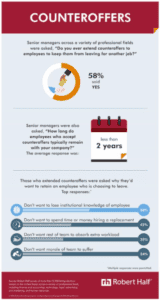It may seem like a good idea at the time. You receive a competitive job offer, accept it, and then decide to leverage it against your current employer. Why not give them an opportunity to come back with more pay, a promotion or additional benefits to keep you?
Here’s why not: It’s not a car dealership. It’s career suicide.
Consider the results of one 2018 survey, which showed 58% of senior managers across diverse professional fields extend counteroffers:
-
More than 50% of all employees who accept counteroffers change companies within the following 24 months.
-
80% say that relationships with co-workers deteriorate and productivity falls among employees who agree to stay.
-
70% add that counteroffers are perceived by employees as a short-term cure for a long-term problem.
-
60% of the managers and recruiters questioned say they would never personally accept a counteroffer from a current employer.
Counteroffers are short-term fixes, not long-term promises
You may be flattered when an employer reacts to your resignation with compliments, offers you another $15,000 to stay on, and maybe throws in some flextime or other perks. They may even try to guilt trip you into staying. But ask yourself, why did it take your resigning to offer them what you’re worth?
It’s because they don’t have an immediate backup plan and need to protect their business. Particularly in a hot job market, employers know it’s going to take months to find and train your replacement. In fact, only 3% of surveyed reward and HR professionals in a 2017 Loyola University Business School study said their company had a formal counteroffer policy.
In fact, the report concluded, “Knowing when and how to make counteroffers is difficult and can often lead to poor decisions, especially in a time-pressure situation.”
You didn’t become a valued asset overnight. In other words, a counteroffer is not about you, especially if you’ve previously raised concerns. A counteroffer — as generous as it may seem, as obsequiously as it may be proffered — is all about the employer’s needs at the time. Yes, the truth hurts.
“Don’t let your ego or feeling flattered that you’re being offered more money cloud your judgment or cause you to make a bad decision,” says Lisa Quast, author of Your Career, Your Way: Personal Strategies to Achieve Your Career Aspirations. “You already did your homework, so feel secure about the process you went through to seek a different job.”
Loyalty is out the door
It’s no coincidence that that sounds like a bad breakup line — “It’s me, not you” — because counteroffers invariably end badly (see earlier survey results). You’re risking damaging your future relationship with your employer and possibly colleagues who may perceive your gambit as unfair.
Loyola Business School researchers found that while managers may question the loyalty of employees who accept counteroffers, 59% of those surveyed said their relationship usually did not change and generally stayed on course. A reported 12% believed the relationship worsened, and 16% believed that it improved.
However, in my experience, from your employer’s standpoint, using another offer as a bargaining chip is like telling your spouse you went on a date. You can never be trusted again. And guess what happens? You accept the counteroffer, you become a flight risk, and your employer starts running a confidential search for your position behind your back. No joke.
They need time to work on getting the next executive on board, and you just gave them that.
You’re Back to Square One
People typically don’t leave jobs just for more money or benefits so the glow of a counteroffer soon fades.
They realize that the reasons they were looking for a new job in the first place still exist, whether it’s boredom, problems in the workplace environment or the type of work itself. (Plus, more responsibility may have accompanied that counteroffer increase in pay.) The underlying issues that sent you into the market haven’t changed.
The grueling hours? The colleague you can’t stand? The lack of professional development. Still there. And that other job? It’s gone to someone else.
Now You’ve Burned Two Bridges
There are few things more frustrating — or eye-opening — to prospective employers than to lose candidates who go through the search process and even accept a job only to back out to stay in their current situation.
They know the odds are now stacked against you (see survey results above) and have to wonder if you are as intelligent as they thought you were. After all, if you could be easily swayed into what’s best for a company and not your career, what does that say about you?
Productive Leveraging
Leveraging a job offer to force change is never a good idea, and any experienced executive recruiter will make a strong case against accepting (and offering) counteroffers.
A recruiter also can help job seekers navigate ways to negotiate with their current employers for a pay increase, promotion or more benefits instead of trying to leverage a resignation to force change.
One way is to tell your manager that you are happy in your job, but recruiters are constantly calling with unsolicited openings in a higher pay range. You can say, “I wasn’t looking, but it’s a distraction hearing that I’m qualified for opportunities that are $X,000 above where I’m being compensated today. I have every reason to not take those calls. What are your thoughts? Can we do anything about this?”
State the value that you bring to the company, explain your motivations (perhaps you need a new car or want to buy a home), and ask whether your manager feels if there is any room for you to see a compensation increase or other desired change.
You may or may not receive the answer you want, but at least you’ll know.
What do you think? Have you ever accepted or offered a counteroffer? What happened?





